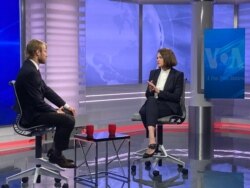In her first official visit to the U.S., Belarusian opposition leader Sviatlana Tsikhanouskaya hopes to spur Washington to act in support of democratic activists and civil society groups in her country.
“I call on the U.S.A. to be with us,” she said during an interview with VOA. “It’s very important when a regime is destroying everything in Belarus, destroying mass media, destroying all the organizations, it’s extremely important to support all those people.”
Upon arrival, Tsikhanouskaya held a rally with supporters at Freedom Plaza in Washington D.C. She is scheduled to hold meetings at the State Department, the White House, with members of Congress and with the administrator of the United States Agency for International Development, Samantha Power.
“I want the U.S. to keep Belarus on the agenda. My main purpose of course is to talk about Belarus, about the situation, about the escalation of violence from the side of the regime.”
Tsikhanouskaya had to leave Belarus with her two minor children after a brutal crackdown on peaceful protesters following a contested election on August 9 of last year. Incumbent President Alexander Lukashenko claimed victory for a sixth consecutive time.
One of the outstanding issues for democratic Belarus — and Tsikhanouskaya personally — is the release of more than 500 political prisoners arrested by authorities during the crackdown. Her husband, Siarhei, is one of them.
“The only way out, how to release prisoners, is to put political, economic pressure on them [Belarus’ government] and I’m sure that it will happen rather soon.”
Observers say the visit will be closely watched by Russian President Vladimir Putin who wants to continue to have significant influence on what goes on in Russia’s eastern neighbor.
“[He] doesn’t necessarily want to see a fellow autocrat — that he perceives to be part of his sphere of influence — fall, and certainly doesn’t want to see democracies rise on the Russian border,” said Jonathan Katz of the; German Marshall Fund, a public policy think tank.
Some in the U.S. political establishment believe there may be an opportunity to make Lukashenko less attractive to his Russian counterpart.
“There has not been a smooth relationship between Russia and Belarus over a period of time,” said U.S. Senator Ben Cardin, Democrat of Maryland.
Lawmakers believe increasing the political and economic pressure on Lukashenko could weaken him and make him too costly to support, even for allies like Putin.
“So, what needs to change is there has got to be a higher price for him [Lukashenko] to pay. That means doubling down on the sanctions,” said Cardin.
The U.S., the European Union and others placed sanctions on the Belarusian regime at the end of June, but the country’s civil society and media organizations were hit with yet another wave of arbitrary arrests and detentions last week.
“I suppose that [the] regime will release political prisoners when they will feel political and economic pressure,” Tsikhanouskaya said. “For many years or, for many months, we tried to appeal to the regime on [a] diplomatic level, through different organizations and through solidarity with the whole world, but [the] regime doesn’t want to listen. And the only way out, how to release prisoners, is [to] put political, economic pressure on them [the regime].”






